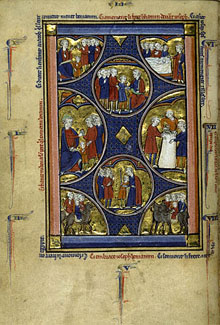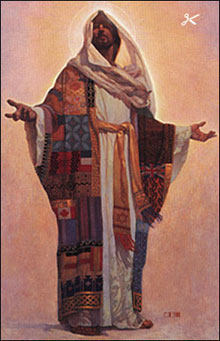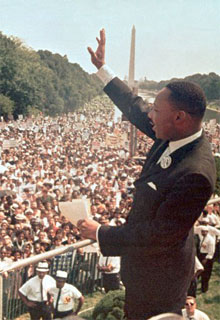Unjust Justice
Guest essay by Don Thorsen, Professor of Theology at Azusa Pacific University. Don has authored several books, including The Wesleyan Quadrilateral. He also serves on various Christian editorial boards and ecumenical groups such as Faith and Order.
For Sunday August 7, 2005
Lectionary Readings (Revised Common Lectionary, Year A)
Genesis 37:1–4, 12–28 or 1 Kings 19:9–18
Psalm 105:1–6, 16–22, 45b or Psalm 85:8–13
Romans 10:5–15
Matthew 14:22–33
 |
Jacob and Joseph, unknown, France, circa 1250. |
Joseph and His Family
Scripture tells of Jacob and his family, and of how Jacob loved his son Joseph more than his other eleven sons. Joseph was the firstborn of his wife Rachel, for whom Jacob had labored fourteen years to marry. After the birth of Joseph and his brother Benjamin, Rachel died, and Joseph remained Jacob’s greatest remembrance of Rachel. So, Jacob spoiled Joseph.
Jacob’s preference for Joseph undoubtedly manifested itself in many ways. The way that infuriated his brothers most was that Jacob gave Joseph a luxurious robe. It was a coat of many colors that privileged him above his brothers. Everyone could see it. As a result, scripture says that Joseph’s brothers hated him and could not speak peaceably to him.
Compounding Injustice
In response to the injustice perpetrated against them, Joseph’s brothers conspired to kill him. This solution is extreme, but for one reason or another they felt there was no alternative to achieving justice than to pursue unjust means for eliminating Joseph. Certainly they compounded injustice by choosing fratricide rather than a more peaceable means. They wanted an unjust justice.
 |
The coat of many colors. |
To be sure, Joseph and his brothers lived during a time when justice and communicating about justice, especially in relationship with their father, was not easily accomplished. Were they slaves to their cultural milieu? Although we may be sympathetic toward them, scripture states that Joseph’s brothers were at fault.
When Joseph was sent by his father to check out how his brothers were doing in shepherding the family’s flocks, Joseph’s brothers found their chance to rid themselves of him. When Joseph arrived, his brothers captured him and stripped him of his robe. If not for the pleadings of Joseph’s brothers Reuben and Judah, the other brothers would have killed Joseph then and there. They would have made an excuse for Joseph’s murder by claiming that he had been killed and devoured by wild animals. Instead, the brothers sold Joseph into slavery to traders on their way to Egypt.
Justice Gone Awry
Was it for jealousy and hatred that Joseph’s brothers sold him into slavery, or was it due to the injustice they experienced from their father? One cannot help but feel some sympathy for Joseph’s brothers for the obvious favoritism Jacob lavished on Joseph. Jacob did treat his children unjustly, and such injustice should not be indulged. Christians ought to be concerned about and act on behalf of justice. However, they ought not use unjust means for pursuing it.
 |
Joseph being sold, Flemish, circa 1525. |
Christians have a patchy record—at best—in terms of how they have acted on behalf of justice. Everyone is aware of the classic acts of oppression and violence committed by Christians against others: the crusades, inquisition, and other persecutions carried out against Christians as well as non-Christians. Today Christians continue to be accused of doing ‘violence’ against others. This is due, at least in part, to postmodern concerns about triumphal presentations of any beliefs, values and practices as being ‘the way, the truth, and the life,’ without regard for those of others. Certainly Christians need to be sensitive in how they speak and relate to others.
All the same, notable examples abound about Christians who acted faithfully and heroically for the sake of justice—for what they believed God called them to do. Advocates for justice include more than acts of compassion on behalf of those who suffer. It also includes those who sought to change ecclesiastical, political, and social structures that marginalize, oppress and persecute others. Christians such as William Wilberforce advocated the abolition of slavery. Walter Rauschenbusch advocated changes in governmental policies that created and perpetuated poverty. Martin Luther King, Jr., advocated civil rights for all races. Other examples could be added for those who advocated on behalf of women, children, and those challenged physically and other ways.
 |
Martin Luther King's, Jr., "I have a dream" speech. |
Compassion and Advocacy
Christians should continue to perform acts of compassion because there is great need for the alleviation of pain and suffering in life, including spiritual pain and suffering caused by sin. They should not lag in proclaiming the good news of Jesus Christ for people’s salvation. As the apostle Paul says, “And how are they [people] to believe in one of whom they have never heard?” (Romans 5:14). It is a matter of justice, spiritually speaking, to proclaim Jesus Christ to those oppressed by sin, bondage and death.
Christians should also advocate justice for themselves, their families, their churches, and the various levels of civic responsibility they have in society. Such activism has not always been valued by churches. Yet, it is as much a matter of justice, spiritually speaking, to act on behalf of the poor and disenfranchised as it is to act on behalf of their eternal lives.
 |
Joseph and the Amazing Technicolor Dreamcoat. |
How Shall We Then Live?
Christians should examine their lives and seek to act justly in their various relationships. That includes their relationships with spouses, children, parents, and friends. It also includes social relationships in the church, since injustice can occur anywhere. Likewise, Christians should not hold back from involving themselves in overturning injustices in society. Although God calls us to be supportive of those in leadership, our ultimate loyalty is to God and to bringing about justice in all aspects of our lives. Just as Jesus advocated ministering to the holistic needs of the poor—whoever they may be—Christians should endeavor to overturn injustices and bring about peace with one another, individually and collectively, as well as peace with God.
In pursuing justice, Christians should be aware of their means for pursing it. They should not use unjust means for achieving a righteous goal. Ultimately, it is God who is responsible for righting every wrong and for providing eternal life. In the meantime, we are called to partner with God’s grace for loving our neighbors as ourselves in advancing the good news—good news that includes compassionate ministries and advocacy for the sake of justice and peace.





